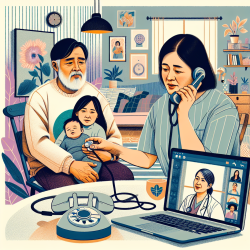The COVID-19 pandemic has been a challenging time for everyone, but for parents of children with chronic illnesses, it has been especially difficult. A recent study titled "Parenting a child with a chronic illness during a pandemic" sheds light on the unique stressors these parents face and offers valuable insights for practitioners looking to improve their support strategies.
The Study: Key Findings
The study aimed to explore the stress levels experienced by parents of children with special healthcare needs (CSHCN) during the pandemic. It involved 34 mothers who completed the Pediatric Inventory for Parents (PIP) survey, which measures parenting stress related to caring for a child with an illness. The results were telling:
- The PIP Frequency (PIP-F) and PIP Difficulty (PIP-D) scores were significantly higher than in previous studies.
- Stress levels were positively correlated with the age of the child and the length of time since diagnosis.
- Nearly all parents reported increased stress due to isolation, lack of resources, and concerns about the mental health of other children in the household.
Practice Implications: Supporting Parents Better
The findings highlight several areas where practitioners can focus their efforts to better support these families:
1. Addressing Isolation and Lack of Support
Isolation was a major theme among parents in the study. Practitioners should consider creating more opportunities for social interaction, even if virtual, to help alleviate feelings of loneliness. Support groups or online forums can provide a platform for parents to share experiences and advice.
2. Enhancing Mental Health Resources
The study found that many parents experienced worsening mental health during the pandemic. Practitioners should advocate for accessible mental health resources tailored specifically for caregivers of CSHCN. Regular check-ins can also help identify those in need of additional support.
3. Optimizing Telehealth Services
Telehealth emerged as both a positive and negative factor in the study. While it offers convenience and reduces travel stress, some parents found communication challenging. Practitioners should work to improve telehealth platforms and provide training to ensure effective communication during virtual appointments.
4. Focusing on Sibling Support
Siblings of CSHCN often face their own challenges, including anxiety and depression due to increased family stress. Practitioners should consider family-centered care approaches that address the needs of all family members, not just the child with chronic illness.
Encouraging Further Research
This study provides a snapshot of the challenges faced by these families during an unprecedented time. However, there is still much to learn about how best to support them. Practitioners are encouraged to engage in further research to explore interventions that can effectively reduce stress and improve outcomes for both parents and children.
To read the original research paper, please follow this link: Parenting a child with a chronic illness during a pandemic.










